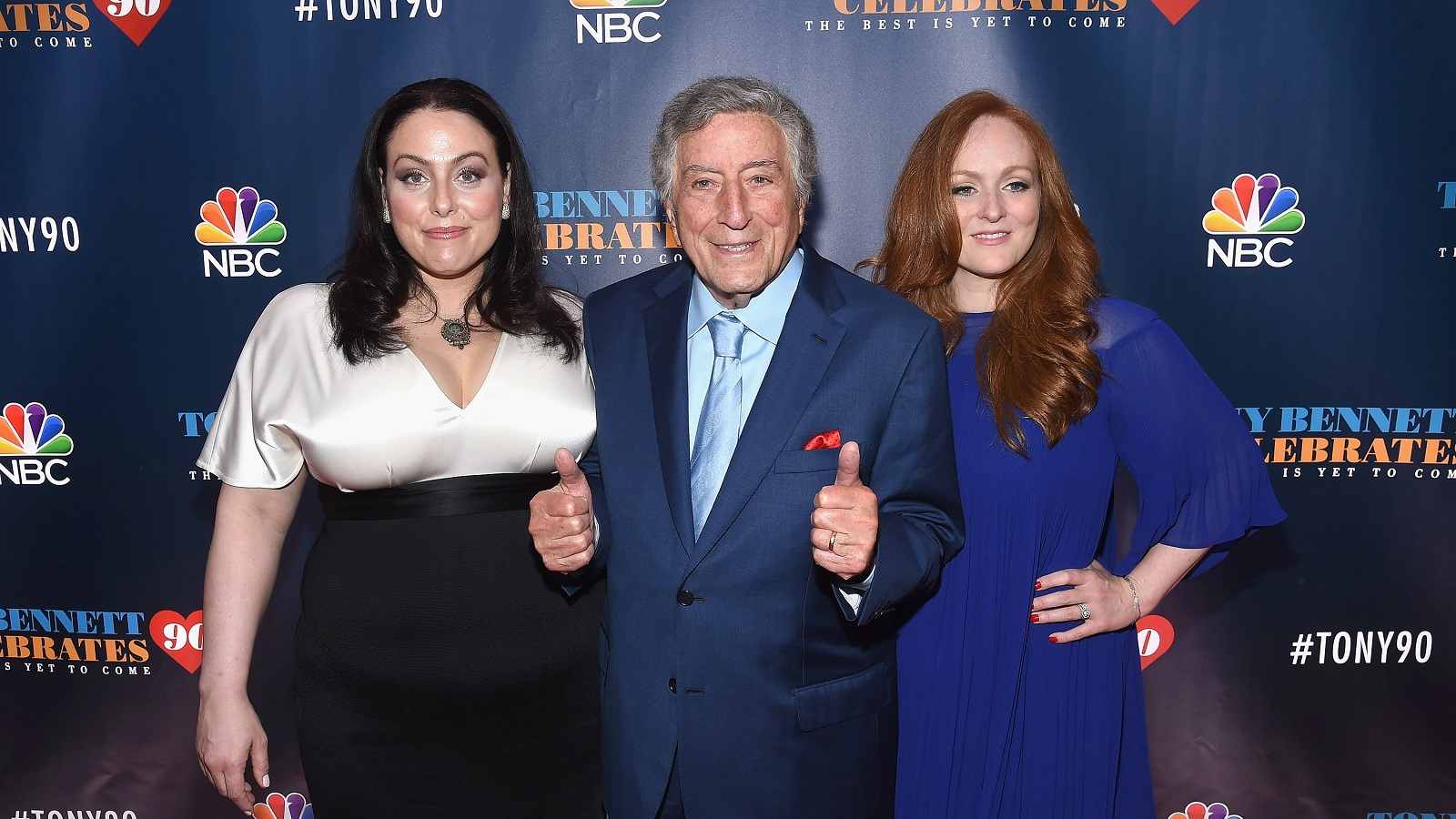Tony Bennett's Daughters Share Thoughts on How to Prevent Inheritance Disputes
Other families, especially high-net-worth ones, can benefit from Johanna and Antonia Bennett's experience encountering estate disagreements.


Profit and prosper with the best of Kiplinger's advice on investing, taxes, retirement, personal finance and much more. Delivered daily. Enter your email in the box and click Sign Me Up.
You are now subscribed
Your newsletter sign-up was successful
Want to add more newsletters?

Delivered daily
Kiplinger Today
Profit and prosper with the best of Kiplinger's advice on investing, taxes, retirement, personal finance and much more delivered daily. Smart money moves start here.

Sent five days a week
Kiplinger A Step Ahead
Get practical help to make better financial decisions in your everyday life, from spending to savings on top deals.

Delivered daily
Kiplinger Closing Bell
Get today's biggest financial and investing headlines delivered to your inbox every day the U.S. stock market is open.

Sent twice a week
Kiplinger Adviser Intel
Financial pros across the country share best practices and fresh tactics to preserve and grow your wealth.

Delivered weekly
Kiplinger Tax Tips
Trim your federal and state tax bills with practical tax-planning and tax-cutting strategies.

Sent twice a week
Kiplinger Retirement Tips
Your twice-a-week guide to planning and enjoying a financially secure and richly rewarding retirement

Sent bimonthly.
Kiplinger Adviser Angle
Insights for advisers, wealth managers and other financial professionals.

Sent twice a week
Kiplinger Investing Weekly
Your twice-a-week roundup of promising stocks, funds, companies and industries you should consider, ones you should avoid, and why.

Sent weekly for six weeks
Kiplinger Invest for Retirement
Your step-by-step six-part series on how to invest for retirement, from devising a successful strategy to exactly which investments to choose.
Tony Bennett will be forever remembered for his passionate performances in which he truly gave his all. Despite belonging to the rock ’n’ roll era, he chose instead to focus on elegant, classic vocals such as those by Frank Sinatra, Bing Crosby and Nat King Cole. Sinatra believed Bennett was the best singer in the world.
Bennett died in July 2023 at the age of 96. He was diagnosed with Alzheimer’s disease in 2016. Tony was survived by his wife, Susan Crow, and his children D’Andrea, Daegal, Johanna and Antonia.
The estate is currently in litigation between some of the beneficiaries and the trustee. This article was inspired by a recent conversation with Antonia and Johanna Bennett. Its purpose is not to address the specifics of the litigation, but rather, the effects of the litigation on the family and to offer steps that other families enduring the death of a parent can take to avoid litigation over the estate and the emotional anguish that it causes.
From just $107.88 $24.99 for Kiplinger Personal Finance
Become a smarter, better informed investor. Subscribe from just $107.88 $24.99, plus get up to 4 Special Issues

Sign up for Kiplinger’s Free Newsletters
Profit and prosper with the best of expert advice on investing, taxes, retirement, personal finance and more - straight to your e-mail.
Profit and prosper with the best of expert advice - straight to your e-mail.
One of the main advantages of a trust-based estate plan is to avoid formal probate proceedings in court. Probate proceedings are typically much more expensive, take longer to complete and are public information (note that some Nevada court proceedings and trust jurisdiction can help maintain privacy and secrecy). However, without any court supervision, there is very little trustee oversight. Disagreements can easily become formal litigation or lawsuits.

John assists business owners, real estate owners and successful families to achieve their enlightened dreams by better protecting their assets, minimizing income and estate tax and resolving messes and transitions to preserve, protect and enhance their legacy. John is one of few California attorneys certified as a Specialist by the State Bar of California Board of Legal Specialization in both Taxation and Estate Planning, Trust and Probate.
Here are four recommendations that could help head off disagreements over an estate:
1. Transparent and timely communication by the successor trustee
Both Antonia and Johanna feel that transparent and timely communication is the most important factor in minimizing inheritance disputes. When beneficiaries receive little information in a piecemeal format, the information received may actually raise more questions than answers.
When a public figure is involved, beneficiaries may even learn about some issues or facts in the news rather than from the successor trustee. Beneficiaries not receiving information on a timely basis will often fear that improper actions are being taken or even that the required actions are not being performed.
2. Consider family dynamics in the estate plan
Tony Bennett is survived by a blended family. D’Andrea and Daegal are 15 to 20 years older than Antonia and Johanna. D’Andrea and Daegal grew up in New Jersey, while Antonia and Johanna grew up in California. Tony loved them all and treated them all equally as children. They shared family traditions, such as meeting after his performances, celebrating Thanksgiving at a restaurant as a family and, of course, sharing the Christmas holidays.
The age differences between the two groups meant that each sibling group would have milestone life events, hobbies and activities, such as sports, at different times. D’Andrea and Daegal started their independent lives as young adults while Antonia and Johanna were quite young. The siblings simply didn’t have much in common while growing up. Blended families like theirs face greater challenges to form a single, cohesive family unit.
Therefore, choosing a trustee from only one side of a blended family may not provide the best protection from disputes during the trust or estate administration. I have some clients who want both sides of a blended family to have equal participation in the administration. One member from each side of the family could be appointed as a co-trustee.
To minimize the effect of disputes between the co-trustees, my firm would utilize an independent “tie breaker” to resolve disputes. In the event of a disagreement, each co-trustee would explain his or her concern and issue to the tie breaker, who would make a King Solomon-type decision to resolve the dispute that the co-trustees were bound to follow.
3. Consider a professional trustee
As an attorney, I often discuss the use of a professional trustee for a blended family. This prevents a related-party trustee from letting family baggage influence his or her decisions as a trustee. I also discuss this even in the absence of a blended family when one sibling is overseeing or controlling the share received by a brother, sister or other relative. Will that sibling have the emotional strength to say “no,” if that is appropriate? Will their relationships be affected by the decisions made by the sibling? If the distribution of a share is withheld or delayed, could that share later be distributed by the trustee making that decision?
For example, a brother is the trustee for his sister’s share. That share would go to the brother if not distributed to the sister during her lifetime. This creates an immediate conflict of interest. I often ask the client what Thanksgiving or Christmas would be like if there is unhappiness due to a trustee’s action or inaction.
A professional trustee would never be a potential beneficiary and prevents a perceived conflict of interest in making decisions. Both Johanna and Antonia believe that having an impartial and knowledgeable professional acting as the trustee would help prevent future disagreements and disputes between family members. Tony Bennett certainly wanted his family to continue to be a family after his death, as virtually all of my clients who are parents do, to continue family traditions and for the future generations to know one another and celebrate their lives together.
A professional trustee is even more important for a public figure and for a high-net-worth individual. Tony Bennett fits both categories. He was one of the most famous artists in the world whose fans developed an almost personal relationship with him due to his passionate voice and performance.
Tony Bennett was both a high-net-worth individual and a “business” that continues to operate. Intellectual property including music and recordings will continue to be sold for decades or even generations to come. This creates a complexity that calls for a professional trustee to ensure fairness, transparency and confidence for the beneficiaries.
4. Consider a collaborative plan
Both Antonia and Johanna indicated that their father discussed his estate plan many times, along with his intent to treat his kids equally.
In a Thanksgiving letter to shareholders, Warren Buffett described how his children read his estate plan and were provided an opportunity to provide feedback and ask questions. Buffett indicated that he learned this collaborative and transparent process for estate planning from his father. Buffett’s father also permitted him to read his estate plan, ask questions and provide comments. This may be particularly beneficial for high-net-worth families whose estates can be exceedingly complicated because of the type, diversity and value of the assets owned.
When beneficiaries are allowed to see the plan and get answers to their questions, they do not end up asking “why” when there is no one to answer.
A collaborative plan may not be for everyone. Lawyers are often taught, or otherwise learn, to be aware that their client may be improperly influenced or manipulated by others. We are careful to always meet alone with the client at some point to be sure that is not happening and also to be able to testify or confirm that fact in the event of a dispute.
That said, for the right person, particularly a high-net-worth family or someone with an otherwise complex estate or needs, a collaborative plan may be the best way to identify that client’s or family’s true wishes and needs. A collaborative plan may also be the best way to avoid litigation and for the family relationships to remain intact.
Careful planning is needed along with transparent communication to keep families together after the parents pass. The emotional challenge of a loss is difficult in and of itself. Avoiding unexpected results or surprises is critical to keep the family together. While Tony Bennett left us an amazing musical legacy, I am sure that he would say his greatest legacy is his family.
This article has been updated to clarify information shared about Antonia and Johanna Bennett.
Related Content
- What We Can Learn from Tony Bennett's Estate Dispute
- Three 'Yellowstone' Estate Planning Lessons
- Five Estate Planning Lessons We Can Learn From Elvis’ Mistakes
- Nine Lessons to Be Learned From the Hilton Family Trust Contest
- Eight Types of Trusts for Owners of High-Net-Worth Estates
Profit and prosper with the best of Kiplinger's advice on investing, taxes, retirement, personal finance and much more. Delivered daily. Enter your email in the box and click Sign Me Up.

Founder of The Goralka Law Firm, John M. Goralka assists business owners, real estate owners and successful families to achieve their enlightened dreams by better protecting their assets, minimizing income and estate tax and resolving messes and transitions to preserve, protect and enhance their legacy. John is one of few California attorneys certified as a Specialist by the State Bar of California Board of Legal Specialization in both Taxation and Estate Planning, Trust and Probate. You can read more of John's articles on the Kiplinger Advisor Collective.
-
 How to Turn Your 401(k) Into A Real Estate Empire
How to Turn Your 401(k) Into A Real Estate EmpireTapping your 401(k) to purchase investment properties is risky, but it could deliver valuable rental income in your golden years.
-
 My First $1 Million: Retired Nuclear Plant Supervisor, 68
My First $1 Million: Retired Nuclear Plant Supervisor, 68Ever wonder how someone who's made a million dollars or more did it? Kiplinger's My First $1 Million series uncovers the answers.
-
 How to Position Investments to Minimize Taxes for Your Heirs
How to Position Investments to Minimize Taxes for Your HeirsTo minimize your heirs' tax burden, focus on aligning your investment account types and assets with your estate plan, and pay attention to the impact of RMDs.
-
 How to Turn Your 401(k) Into A Real Estate Empire — Without Killing Your Retirement
How to Turn Your 401(k) Into A Real Estate Empire — Without Killing Your RetirementTapping your 401(k) to purchase investment properties is risky, but it could deliver valuable rental income in your golden years.
-
 Don't Bury Your Kids in Taxes: How to Position Your Investments to Help Create More Wealth for Them
Don't Bury Your Kids in Taxes: How to Position Your Investments to Help Create More Wealth for ThemTo minimize your heirs' tax burden, focus on aligning your investment account types and assets with your estate plan, and pay attention to the impact of RMDs.
-
 Are You 'Too Old' to Benefit From an Annuity?
Are You 'Too Old' to Benefit From an Annuity?Probably not, even if you're in your 70s or 80s, but it depends on your circumstances and the kind of annuity you're considering.
-
 In Your 50s and Seeing Retirement in the Distance? What You Do Now Can Make a Significant Impact
In Your 50s and Seeing Retirement in the Distance? What You Do Now Can Make a Significant ImpactThis is the perfect time to assess whether your retirement planning is on track and determine what steps you need to take if it's not.
-
 Your Retirement Isn't Set in Stone, But It Can Be a Work of Art
Your Retirement Isn't Set in Stone, But It Can Be a Work of ArtSetting and forgetting your retirement plan will make it hard to cope with life's challenges. Instead, consider redrawing and refining your plan as you go.
-
 The Bear Market Protocol: 3 Strategies to Consider in a Down Market
The Bear Market Protocol: 3 Strategies to Consider in a Down MarketThe Bear Market Protocol: 3 Strategies for a Down Market From buying the dip to strategic Roth conversions, there are several ways to use a bear market to your advantage — once you get over the fear factor.
-
 Dow Adds 1,206 Points to Top 50,000: Stock Market Today
Dow Adds 1,206 Points to Top 50,000: Stock Market TodayThe S&P 500 and Nasdaq also had strong finishes to a volatile week, with beaten-down tech stocks outperforming.
-
 Why Picking a Retirement Age Feels Impossible (and How to Finally Decide)
Why Picking a Retirement Age Feels Impossible (and How to Finally Decide)Struggling with picking a date? Experts explain how to get out of your head and retire on your own terms.